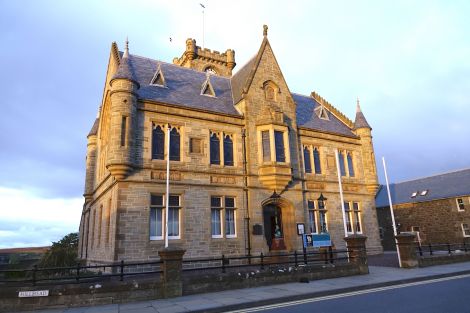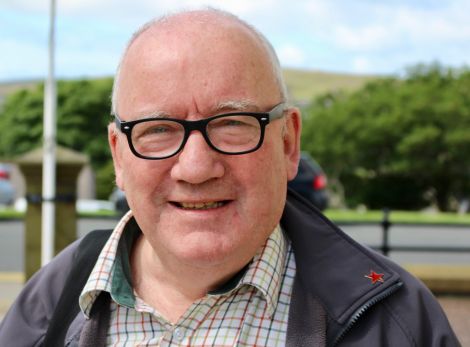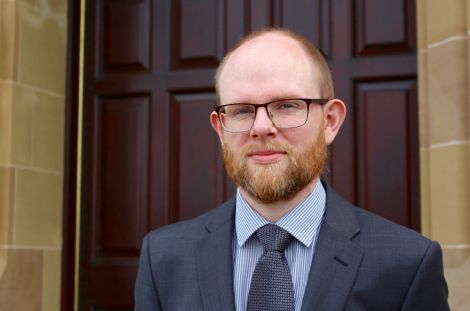Council / Council tax rise given go-ahead as SIC left ‘stuck between rock and a hard place’
COUNCIL tax in Shetland is set to rise by 4.84 per cent after councillors gave the move their reluctant backing on Wednesday.
It comes as the local authority looks to be faced with a funding gap of over £12 million for the year ahead following the draft Scottish budget, which was published recently.
Councillors said they felt their hands were tied by the government’s draft settlement.
Shetland Central member Ian Scott raised an amendment to increase council tax by the consumer price index of 1.8 per cent but he did not secure a seconder to move his proposal forward.
Shetland Islands Council is joining a number of other local authorities in Scotland in upping its council tax for the next financial year.
Councillors also approved an average 2.39 per cent increase on housing rent charges for 2020/21.
The option to increase council tax by the maximum 4.8 per cent is estimated to generate an additional £569,000 a year.
It would mean the annual band D rate would be £1,206.33 – an increase of £1.07 a week or £55.69 a year compared to the current 2019/20 rate.
Council tax has been increased by Shetland Islands Council annually in the last few years.
The latest move comes after the Scottish Government included £5 million in its recently published draft budget for the SIC to run its inter-island ferries when its full ask was £9.49 million.
A report presented to a meeting of the full council on Wednesday by finance manager Jamie Manson said before the council tax increase there was a projected funding gap of £12.3 million for 2020/21.
The council is considering a number of options to reduce that gap, “namely by reducing expenditure through efficiencies, or increasing anticipated income through a further use of reserves, albeit in excess of the amount considered sustainable”, the report said.
Become a member of Shetland News
The council’s latest budget estimates, meanwhile, assume that £14.1 million will be withdrawn from the SIC’s long-term investments to supplement its general fund budget on a sustainable basis.
“A further withdrawal to meet the current funding gap is unsustainable and will have long-term implications on the extent to which the reserves can be relied upon to contribute to future budgets, and ultimately support the delivery of services across Shetland,” the report warned.
At Wednesday’s meeting Manson said it is expected that more clarity will come some on a possible revised settlement once the budget starts going through parliament.
Councillor Scott said at the meeting that he did not understand why the SIC could not dip into its reserve fund instead of rising council tax.
Manson said at the end of January the reserves sat at just under £370 million.
Lerwick South member Amanda Hawick also sought clarity on the use of reserves, with Manson confirming the projected funding gap comes in addition to the predicted £14.1 million draw from reserves in the coming year.
Council leader Steven Coutts said no one around the chamber table was looking forward to the prospect of increasing charges.
But he said the SIC was “stuck between a rock and a hard place when it comes to our council tax setting”.
Westside member Coutts said he felt there was “no other option” but to go with the rises, with the leader moving the recommendations and Councillor George Smith seconding.
Davie Sandison said councillors were sitting in the chamber with a “groundhog day feeling” after going through the same process in previous years – but he said this time around it was even worse.
“We absolutely have no choice,” the Shetland Central member said.
He encouraged more dialogue to make it “absolutely clear there’s no room left for cutbacks in local government expenditure”.
Councillor Smith also said elected members were left feeling “highly frustrated”.
He said local governments were stuck between being criticised by members of public who felt services were not being improved despite council tax rises, while at the same time being squeezed by the government.
Smith added that he felt the Scottish Government “don’t seem committed” to fair funding of ferries.
He added criticism of the level of ring-fenced funding that comes to local authorities, suggesting the money could often be better spend if it wasn’t restricted.
Fellow southend member Allison Duncan echoed the views in the chamber, but he also paid tribute to the work the local Citizen’s Advice Bureau – a “godsend” – do in helping people get the right benefits.
He also warned that expenditure needs to be kept in check, otherwise things could hark back to a decade ago when auditors gave the SIC a “real roasting” over its finances.
Councillor Scott, meanwhile, said with the reserves the council holds, “we are in a position to do something about it”.
“With the returns that we have, we can mitigate this slightly,” he said.
Scott said that if the council voted for the rises, “we do it because we choose to”.
“We should have a good look at our own consciences,” he said.
He proposed amendment to raise council tax by 1.8 per cent – the consumer price index – but he failed to secure any support.
Lerwick member John Fraser said it was with a “degree of reluctance” that he chose not to back Scott.
He said with many in line to pay around an extra £1 a week, “there will not be a material difference to many people”.
Fraser added, however, that he felt there might be a greater negative effect to certain people if the council had to look to find £569,000 in savings by cutting services.
Amanda Hawick said it was with a “heavy heart’” that she felt left in position but to support Coutts’ motion to approve the increase, although she also expressed sympathy for Scott.
She said she felt the council needed to take a “serious look” at its spending.
SNP councillor Robbie McGregor said he wanted to join in the criticism of the Scottish Government – which is run by his own party.
But he suggested the finger should be pointed at the level of funding which comes Scotland’s way from Westminster.
“For goodness sake let’s lay the blame where it rests,” McGregor said.
Scott spoke up again about the reserves as the debate reached its end, but leader Coutts said the council needed to think about developing a “positive legacy”.
He paid tribute to the work of the council over the last decade in getting its finances back into shape after spending too much.
“The challenge we have is the squeeze on funding,” Coutts said – adding that he “makes no apologies” for continuing to argue for a better financial settlement from the government.
His motion was passed – but Scott made it clear he wanted it recorded that he was opposed to the motion.
Become a member of Shetland News
Shetland News is asking its readers to consider paying for membership to get additional perks:
- Removal of third-party ads;
- Bookmark posts to read later;
- Exclusive curated weekly newsletter;
- Hide membership messages;
- Comments open for discussion.
If you appreciate what we do and feel strongly about impartial local journalism, then please become a member of Shetland News by either making a single payment, or setting up a monthly, quarterly or yearly subscription.
































